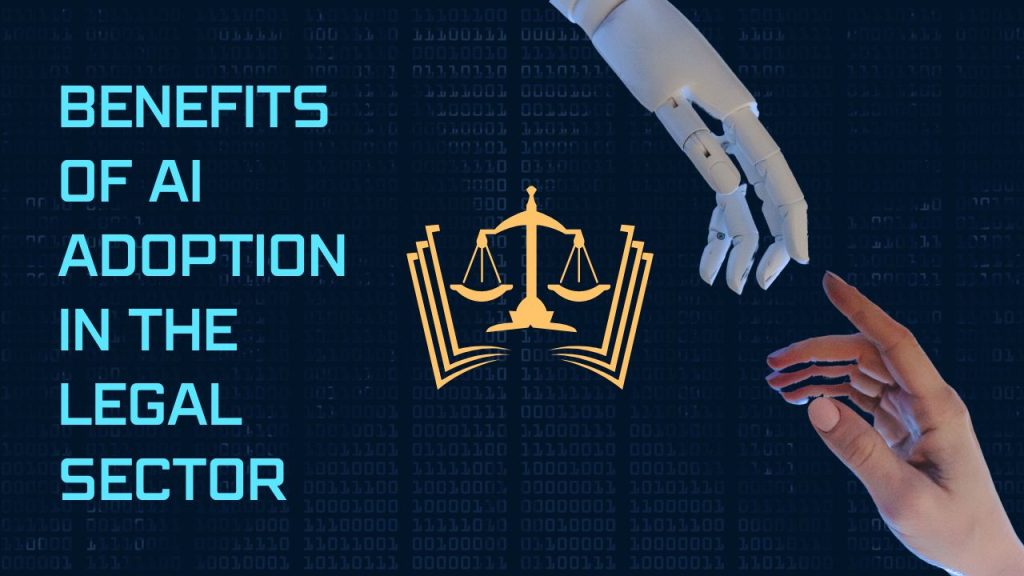Artificial Intelligence (AI) has become a transformative force across various sectors, and the legal industry is no exception. With its ability to process and analyze vast amounts of data, AI offers numerous advantages for legal professionals. This article will delve into the potential benefits of embracing AI in the legal sector and explore the various applications that can revolutionize legal processes.
Understanding Artificial Intelligence in the Legal Sector
Let’s start learning about Artificial Intelligence (AI) in the legal field. We’ll begin by understanding what AI means in law, and then we’ll look at the differences between two types of AI, narrow and general, and how they’re used in legal stuff.
Defining Artificial Intelligence in the Legal Context
Artificial Intelligence in the legal sector refers to the utilization of advanced algorithms and machine learning techniques to assist legal professionals in their work. The key characteristics of AI in this context include the ability to understand natural language, analyze complex legal documents, and provide intelligent insights.
Differentiating between narrow and general AI in legal applications
In the legal sector, AI can be classified into two categories: narrow AI and general AI. Narrow AI focuses on specific tasks, such as legal research or contract analysis, while general AI possesses human-like intelligence and the ability to perform a wide range of tasks. However, general AI is still in its early stages and not widely adopted in the legal field.
Now, let’s discuss the applications of AI in the legal sector.
Potential Applications of AI in the Legal Sector
AI has the potential to enhance various aspects of legal practice, such as:
Key Benefits of AI Adoption in the Legal Sector
Let’s discuss the benefits of adopting AI in the legal industry.
1. Increased Efficiency and Productivity
By leveraging AI to automate time-consuming legal tasks, legal professionals can achieve higher levels of efficiency and productivity. AI systems can process information at a much faster rate than humans, reducing the time required for research, analysis, and document review. This automation also minimizes the chances of human error, ensuring accuracy in legal processes.
Moreover, AI’s ability to handle administrative tasks allows lawyers to focus on more complex legal matters, such as case strategy development and client counseling. By delegating mundane tasks to AI, legal professionals can maximize their productivity and deliver better outcomes for their clients.
2. Cost-effectiveness and Time Savings
AI adoption in the legal sector can bring significant cost savings. By automating repetitive tasks and streamlining processes, legal expenses can be minimized. AI tools can assist in accelerating legal processes, thereby reducing case duration and associated costs.
Furthermore, efficient resource allocation and budget management can be achieved through AI-powered analytics. By analyzing data on previous cases and resource utilization, legal professionals can optimize the allocation of their time, workforce, and budget resources, leading to cost savings and improved operational efficiency.
3. Improved Legal Research and Analysis
One of the most significant benefits of AI adoption in the legal sector is the power to enhance legal research and analysis. AI algorithms can analyze large volumes of legal data, including court cases, statutes, and prior legal opinions, providing valuable insights for legal professionals. With AI’s assistance, lawyers can identify relevant legal precedents and potential arguments more efficiently, streamlining their case preparation and strategy development processes.
4. Enhanced Decision-making and Case Prediction
AI tools can significantly improve decision-making capabilities in the legal sector. By leveraging AI algorithms and predictive models, legal professionals can make more accurate case outcome predictions. These predictions can assist in developing effective legal strategies based on data-driven insights, enhancing the chances of success in legal matters.
Further, AI can support judges in making informed decisions by providing comprehensive and relevant information. This can lead to fairer judgments and a more efficient judicial system overall.
5. Revolutionizing Legal Document Management
AI adoption in the legal sector revolutionizes the way legal documents are created, managed, and processed. AI tools can automate the drafting of legal documents, ensuring accuracy and standardization. Furthermore, these tools simplify contract creation and management processes, reducing the chances of errors and improving efficiency in dealing with legal documents.
Concerns and Challenges Surrounding AI Adoption
Let’s discuss the concerns and challenges in adopting AI in the legal sector.
1. Impact on Legal Professionals and Job Market
The integration of AI in the legal sector has raised concerns about job displacement and automation anxiety among legal professionals. However, it is important to recognize that AI is not intended to replace lawyers. Instead, it complements their work by automating repetitive tasks, allowing legal professionals to focus on more complex, high-value work.
The role of lawyers is evolving in an AI-driven legal sector, with an increasing emphasis on leveraging AI-powered tools to enhance their skills and expertise. Lawyers need to adapt to these changes by developing new competencies and embracing technology as a valuable tool in their practice.
2. Ethical Considerations and Potential Bias
While AI offers significant benefits, it also raises ethical considerations in legal decision-making. AI algorithms may inadvertently introduce biases based on the data they are trained on, potentially leading to unfair outcomes. It is important to ensure that AI systems are designed and trained to be impartial, transparent, and fair.
Legal professionals and AI developers must work together to establish ethical guidelines and monitor AI systems to prevent any potential biases. Regular audits of AI algorithms can help identify and rectify these issues, ensuring fairness and equity in legal decision-making.
3. Legal and Regulatory Frameworks for AI Integration
The legal sector faces the challenge of adapting existing legal and regulatory frameworks to address AI’s unique challenges. The laws surrounding AI should balance innovation and consumer protection. Regulatory bodies should update regulations to keep pace with AI advancements and address concerns related to privacy, confidentiality, liability, and accountability.
Legal professionals, policymakers, and technology experts should collaborate to establish robust legal and regulatory frameworks that promote the responsible and ethical use of AI in the legal sector.
Successful AI Integration: Case Studies and Real-world Examples
In this section, we look at real examples where AI integration has made remarkable strides within the legal landscape. Through the lens of these case studies, we gain insights into how AI technologies are reshaping practices, elevating efficiency, and transforming the way legal services are delivered.
Let’s begin by examining the transformative role of IBM Watson in revolutionizing the legal sector and then turn our attention to the innovative endeavors of legal tech start-ups that are driving industry-wide change.
IBM Watson’s Role in Legal Sector Transformation
IBM Watson has played a significant role in revolutionizing the legal sector. Its advanced AI capabilities enable legal professionals to conduct extensive legal research more efficiently and accurately. By analyzing vast amounts of legal data, Watson assists in identifying relevant case precedents, statutes, and regulations, making it an invaluable tool for legal research and case preparation.
Moreover, IBM Watson’s contract analysis capabilities automate the contract review process, identifying potential risks and highlighting crucial clauses. This accelerates the contract review phase and enhances the efficiency of the legal workflow.
Legal Tech Start-ups Revolutionizing the Industry
Several legal tech start-ups have emerged, leveraging AI to transform the legal industry. These innovative companies are introducing disruptive solutions that address common pain points in legal practice. For example, AI-powered chatbots are being developed to answer common legal queries, enhancing access to legal information for individuals and small businesses.
Additionally, start-ups are using AI algorithms to support legal decision-making, providing case outcome prediction models that enable lawyers to make more informed decisions. These AI-driven solutions are driving efficiency, improving access to legal services, and democratizing the legal landscape.
Conclusion
AI adoption in the legal sector has the potential to bring transformative changes, revolutionizing legal processes and enhancing the delivery of legal services. By embracing AI, legal professionals can improve efficiency, save time and costs, and make more informed decisions.
However, it is crucial to address concerns such as job displacement, ethical considerations, and the development of appropriate legal and regulatory frameworks. With careful implementation and responsible use, AI can empower legal professionals, improve access to justice, and transform the legal sector.
Contents
Frequently Asked Questions
Most frequent questions and answers
Artificial Intelligence plays a crucial role in legal practice by automating time-consuming tasks, enhancing legal research and analysis, improving decision-making, and streamlining document management processes.
AI algorithms can analyze extensive legal data quickly and accurately, providing insights, identifying relevant legal precedents, and streamlining case preparation and strategy development for legal professionals.
There are risks, such as potential biases in AI algorithms and concerns regarding job displacement. However, with proper regulation and responsible implementation, these risks can be mitigated, and the benefits of AI adoption in the legal sector can be realized.
IBM Watson’s advancements in legal research and contract analysis are notable examples of AI implementation in the legal field. Additionally, legal tech start-ups are introducing innovative AI-driven solutions that revolutionize legal practice.
Legal professionals can adapt to the changing landscape by embracing AI as a valuable tool, upskilling themselves in AI technologies, and focusing on complex legal matters that require their expertise. Additionally, legal professionals should actively collaborate with AI developers and policymakers to shape the future of AI integration in the legal sector.



